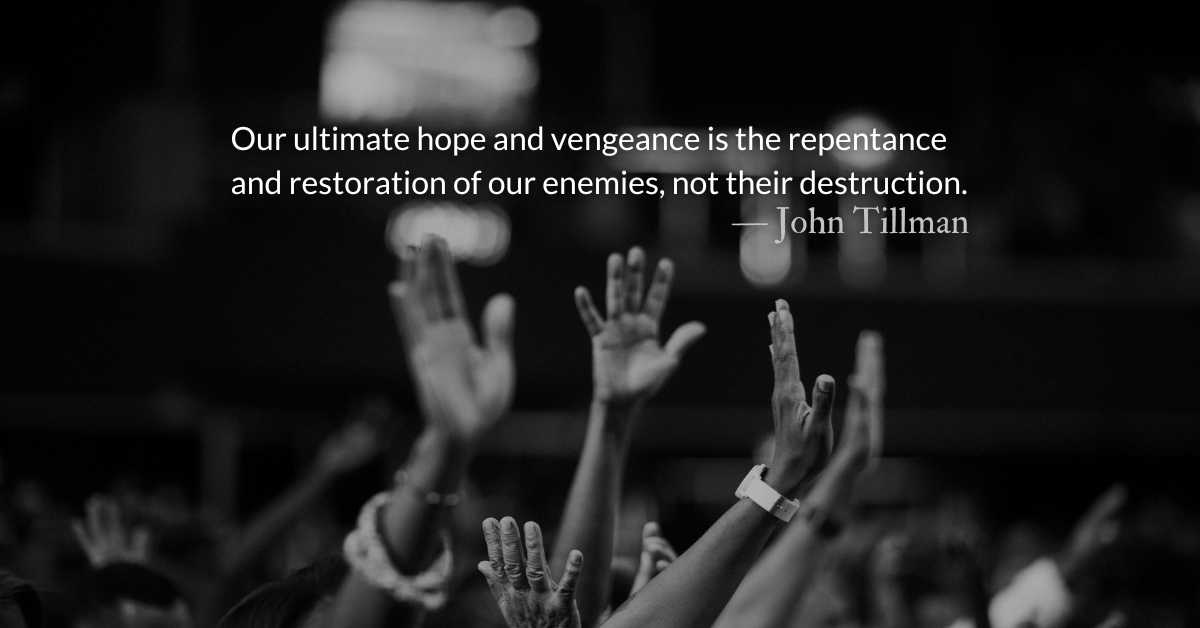Scripture Focus: Jeremiah 12.1-2; 15-17
1 You are always righteous, Lord,
when I bring a case before you.
Yet I would speak with you about your justice:
Why does the way of the wicked prosper?
Why do all the faithless live at ease?
2 You have planted them, and they have taken root;
they grow and bear fruit.
You are always on their lips
but far from their hearts.
15 But after I uproot them, I will again have compassion and will bring each of them back to their own inheritance and their own country. 16 And if they learn well the ways of my people and swear by my name, saying, ‘As surely as the Lord lives’—even as they once taught my people to swear by Baal—then they will be established among my people. 17 But if any nation does not listen, I will completely uproot and destroy it,” declares the Lord.
Reflection: Our Vengeance is Repentance
By John Tillman
The Bible holds many complaints to God. Job, psalmists, Habakkuk, Elijah, Jeremiah, and others come to God with complaints, laments, and questions. One of the most common is: “Why do the wicked prosper?”
God’s response to Jeremiah seems confusing: “If you have raced with men on foot and they have worn you out, how can you compete with horses?” (Jeremiah 12.5) This metaphor told Jeremiah the problem was worse than Jeremiah knew. “It’s not just a few evil people who’ve gotten rich, Jeremiah. Wait until you hear what the shepherds of my people are doing. Wait until you see the full picture.” (Jeremiah 12.10-11)
The Bible is described as a mirror to see what we look like. (James 1.23-24) Another mirror is the state of our world. Paul’s confession in Romans 7 is ours as well: “I do not do the good I want to do, but the evil I do not want to do—this I keep on doing.” (Romans 7.19-24)
Organizations are not immune to Paul’s observation. Don’t we want governments, businesses, and churches to do good? Yet, we are forced to admit continually that “evil is right there with us” (Romans 7.21) Should children starve? Even in the United States, we see it happen. Should people be sexually abused? In secular and religious institutions we see it happen. The evil that we see in the world? It is our face in the mirror—individually and collectively.
The solution to evil isn’t as simple as replacing “bad guys” with “good guys.” Just a few pages ago (Jeremiah 5.1) we learned there aren’t any “good guys.”
Like Jeremiah, sometimes all we feel that we can do is weep. (Jeremiah 4.19; 8.18, 21-22) If it was up to us, that’s all we could do. But God has more in store. Though we and our nation may suffer as violence and extremism gain more ground, we have hope.
This hope transcends vengeance on our enemies. God promises Jeremiah that even Israel’s enemies, used by God to punish them, will be restored by God if they turn to him. (Jeremiah 12.15-17) ANY people who listen, who learn his ways, will be incorporated into God’s family as brothers and sisters.
There will certainly be those who refuse God’s mercy and are destroyed in God’s just wrath. However, our ultimate hope and vengeance is the repentance and restoration of our enemies, not their destruction. Let us love our enemies today, embracing this truth.
Divine Hours Prayer: The Refrain for the Morning Lessons
Blessed be the Lord day by day, the God of our salvation, who bears our burdens.
He is our God, the God of our salvation; God is the Lord, by whom we escape death. — Psalm 68.19-20
– From The Divine Hours: Prayers for Summertime by Phyllis Tickle.
Today’s Readings
Jeremiah 12(Listen -3:06)
Galatians 3(Listen – 4:39)
Read more about The Law that leads to Grace
Christ’s death opened the path of grace through faith to all people. In Christ, God came near…
Readers’ Choice is Coming!
We want to know posts you loved from the past 12 months. Share them with us and we’ll share them with others.






